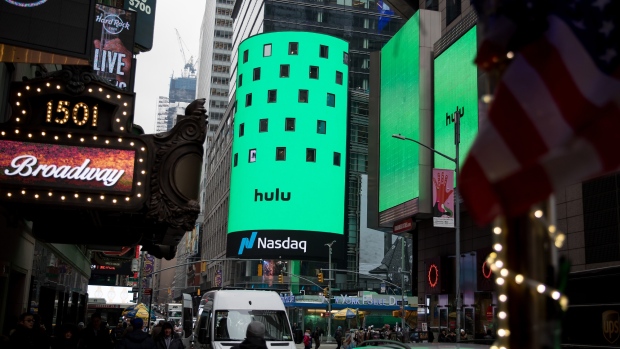Apr 25, 2019
Disney and Comcast's Hulu Dance Shows Bundle Isn't Dead Yet
, Bloomberg News

(Bloomberg Opinion) -- In a short time, consumers have switched from saying “Destroy the cable TV bundle!” to “OK, we kind of miss the bundle.” This has presented Walt Disney Co. with a lucrative opportunity: create its own rival bundle of video apps. The irony is that to make it happen, Disney needs the cooperation of Comcast Corp., the biggest U.S. cable provider and one of its fiercest competitors.
Both companies share ownership of Hulu, a video-streaming platform akin to Netflix. Disney is the majority owner and Comcast has a 30 percent stake. CNBC reported on Thursday that Comcast is considering selling that stake to Disney and that the two have held talks, but it’s not a sure thing yet. Working out a deal is a crucial step for Disney CEO Bob Iger in rounding out his streaming strategy.
With full control of Hulu, the company could offer it together with the Disney+ and ESPN+ apps at a discount to customers who want all three. That would be a compelling subscription bundle for a lot of people: Disney+ brings family-friendly content, ESPN+ has sports and Hulu contains almost everything else. In fact, together they look a lot like a cable package. That’s appealing because consumers are growing frustrated with the cost and complexity of needing multiple streaming products to watch all their favorite TV shows and movies.When Disney unveiled its Disney+ app earlier this month, I argued that while it may be a must-have for “Star Wars” diehards and parents of young children, its name reveals its biggest challenge. “Plus” implies that it’s an add-on service, and Disney needs to persuade enough consumers that it’s worth paying $6.99 a month in addition to whatever else they may subscribe to — namely Netflix, which for many is their base streaming product. For Disney+ to be truly successful and anchor a company that’s accustomed to earning $10 billion a year in profit, it needs to break out beyond an audience of superfans. And with Hulu, it starts to look like a more complete offering for a broader set of viewers.
AT&T Inc. recently sold its 9.5 percent interest in Hulu back to the business for $1.43 billion, giving Hulu a $15 billion valuation. AT&T didn’t need much convincing because it’s been looking for assets to sell. The company inherited the small Hulu stake from its Time Warner acquisition, along with a ton of debt.
But Comcast CEO Brian Roberts has more pros and cons to weigh. Aside from financial considerations (i.e., whether Hulu will be worth more now or later), there’s the simple fact that a deal would mean handing Disney a meaningful competitive advantage. Like all traditional pay-TV services, Comcast’s cable business is in decline, and it’s shifted its focus to signing up internet users to capitalize on the rise of streaming. In reporting first-quarter results Thursday morning, Comcast said it added 375,000 high-speed internet customers and lost 121,000 pay-TV customers. A Disney bundle would accelerate the death of cable, and it puts the company way ahead of Comcast in streaming, which isn’t introducing its own product until next year.
On Comcast’s earnings call Thursday, Roberts wouldn’t divulge his plans for Hulu, simply saying, “We’re really glad we own a large piece of it.” It almost sounds as if he’s taunting Iger again.
To contact the author of this story: Tara Lachapelle at tlachapelle@bloomberg.net
To contact the editor responsible for this story: Daniel Niemi at dniemi1@bloomberg.net
This column does not necessarily reflect the opinion of the editorial board or Bloomberg LP and its owners.
Tara Lachapelle is a Bloomberg Opinion columnist covering deals, Berkshire Hathaway Inc., media and telecommunications. She previously wrote an M&A column for Bloomberg News.
©2019 Bloomberg L.P.





